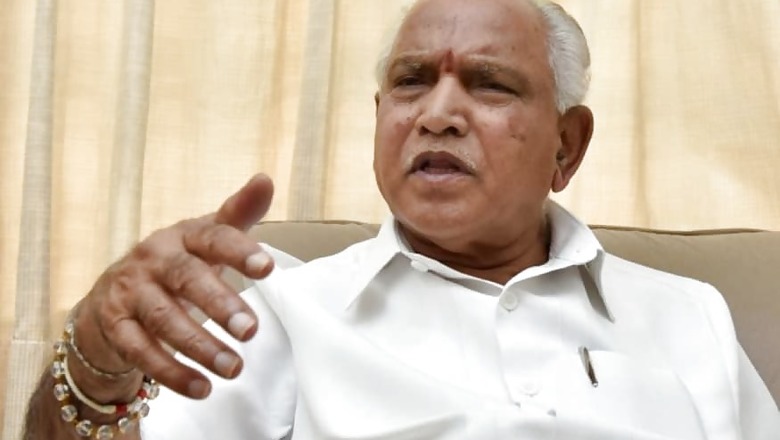
views
The Karnataka government on Monday set up a Special Investment Promotion Task Force to attract multinational companies looking to shift their manufacturing bases from China.
Commerce and Industries Department's Principal Secretary Gaurav Gupta said following the COVID-19 pandemic, there is a pushback against China by several countries.
"Rising labour costs, shortage of workforce, a trade war with the United States, the rise of manufacturing hubs in South-East Asia and now a pandemic that originated on its mainland... China may not be able to retain its position as the world's largest factory in the post-coronavirus global economic order," he said.
This is an opportunity for India to attract them here, bringing with their investments -- both jobs as well as a transfer of technologies, he said.
India stands a good chance to emerge as a reliable substitute, given its congenial landscape for manufacturing as well as its vast consumer market, a Karnataka Government Order said.
For attracting investments and looking to woo disenchanted MNCs considering shifting manufacturing bases away from China in the backdrop of the coronavirus outbreak, there is a need to constitute a Special Investment Promotion Task Force under the chief secretary's chairmanship, it said.
The 17-member team would have nominees or representatives from trade promotion organisations of Japan, Korea, Taiwan, as also US, French, Singapore and German companies, among others.
The task force would identify sectors in which Karnataka can attract investment due to relocation from other countries post-pandemic, formulate special incentive package and "facilitations" which need to be provided to attract these investments.
It would also identify key infrastructure projects, including dedicated industrial townships, which need to be undertaken or expedited to attract investments, measures to fast-track clearances to promote these investments, and recommend outreach activities and brand building to position Karnataka as an attractive investment destination.
In recent days, Large and Medium Scale Industries Minister Jagadish Shettar held consultations with industrialists such as co-founder and non-executive chairman of Infosys Ltd, executive chairperson of Biocon Ltd, Kiran Mazumdar-Shaw and chairman of early-stage start-up accelerator and venture fund Axilor Ventures Senapathy (Kris) Gopalakrishnan to fine-tune the state’s outreach push.
Shettar also held interactions with industry bodies, including Confederation of Indian Industry, the Federation of Karnataka Chambers of Commerce and Industry, Bangalore Chamber of Industry and Commerce and Karnataka Small Scale Industries Association.
Shettar said industrialists who took part in the deliberations suggested focusing on ease of doing business and improving the single-window clearance system for approvals.
"Given the interest shown by some companies in moving their manufacturing bases out of China, the industry leaders recommended the state government identify a target list of 100 firms and work out a strategy to bring them to Karnataka", an official said.
The industry leaders assured cooperation from the private sector in reaching out to and facilitating interactions with CEOs of these companies.
Secretary General of industry body ASSOCHAM, Deepak Sood, said recently there is a broader consensus that the global manufacturing supply chain would be more spread than concentrated in major economies like China.
"If India comes out of the present crisis with minimum of impact, we can be the destination of choice for the global manufacturing giants in different sectors like electronics, computer hardware, pharmaceuticals, including medical devices, automobile, including components and other engineering products," Sood said.
Gopalakrishnan, also co-founder of Infosys and former CII president, said India has to target companies which have operations in China, reach out to them, understand what their needs are and hold discussions with them.
"We have to make sure that their requirements are addressed, be it with regard to land, office space, faster approvals, and some concessions on local taxes.
“It depends on the businesses that the companies are in, and if we are able to respond to those requests, I think we will be able to attract them," he said, while adding all states will compete for this business (foreign investment).
Shettar said restrictions on acquisition of agriculture land for starting industries have now been relaxed with the passage of an amendment to the Land Reforms Act in the recent Legislature session. This would facilitate immediate land allotment to industries, he added.
Earlier, industries that bought farm land had to start operations within two years of purchase -- that has now been changed to seven years, as many industrial bodies had been talking about a longer gestation period.
The government has also done away with a law that said only those with annual incomes of less than Rs 2 lakh will be allowed to buy farm land directly from farmers -- otherwise, industries had to go through government agencies like the Karnataka Industrial Areas Development Board and so on.
These amendments that had been in the pipeline for several months couldn't have come at a better time with the industrial sector battling a severe setback.
"Many farmers with fallow lands or single-crop land want to sell at a good price. For industries also, things will become easy, majority of units can directly buy land instead of waiting for two or three years that the earlier process took," said an office-bearer of the Federation of Karnataka Chambers of Commerce and Industry.
He said the move will help buy land in border districts like Belagavi, Mangalore, Gulbarga and Bellary that have good road/ air connectivity with neighbouring states like Telangana and Maharashtra and hence, could soon develop as industrial hubs.
Gupta said industries will still have to get other clearances for environment and project from different regulatory authorities. It is only land acquisition that will be easier.
"The investment clearance committee at district and state-level will have to clear it, every time a promoter comes with a project proposal -- it depends on nature of activities (by any promoter for an industrial plant), land required and suitability, employment generation, amount invested," Gupta told CNN-News18.
"The government feels it should change restrictive land laws to enable more investment. In many places, farmers who want to sell their land for a good price have not been able to do so because of restrictions. We also have to look at where we see the development of the state in 20 years from now -- will there be more jobs in agriculture, warehousing, logistics or services sector," he added.
(With inputs from PTI)

















Comments
0 comment